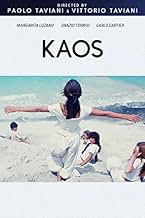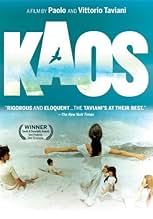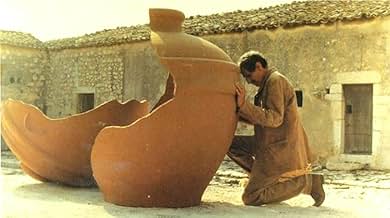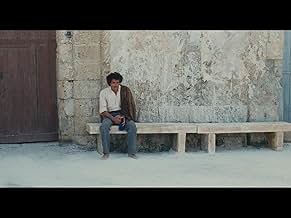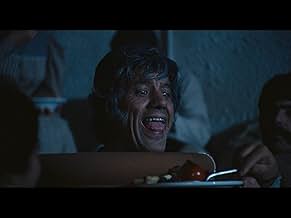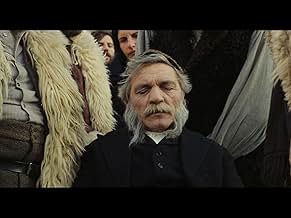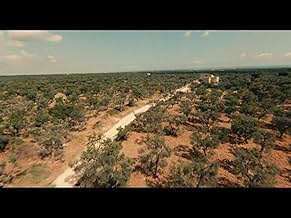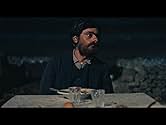IMDb-BEWERTUNG
7,8/10
3322
IHRE BEWERTUNG
Fünf Geschichten von Luigi Pirandello im Italien der Jahrhundertwende.Fünf Geschichten von Luigi Pirandello im Italien der Jahrhundertwende.Fünf Geschichten von Luigi Pirandello im Italien der Jahrhundertwende.
- Auszeichnungen
- 4 Gewinne & 8 Nominierungen insgesamt
Regina Bianchi
- Madre di Pirandello (segment "Colloquio con la madre")
- (as Régina Bianchi)
Empfohlene Bewertungen
"Kaos" (Italian, 1984): Told are five stories, separate but woven together by location (an incredible, ancient, crumbling, sun bleached land) and other unique poetic devices. They are told over 188 minutes. I suggest a short break after each story. They are all unique. Each has separate value, and is worth absorbing. Directed by Paolo & Vittorio Taviani. These unsentimental folk tales are loaded with humanity's weakness, strength, silliness, pettiness, and plenty of important symbolic lessons ALWAYS worth chewing on. When our Old People aren't there to pass along these lessons, at least we have the film makers. The screen is our fire. The seats are our logs. The film team is our story teller. The darkened room is our night.
10wobelix
Once Sicily was the center of our western world, and this film shows us all the beauties of far, far away, together with a Pastorale worthy of a Beethoven Symphony.
No No, Nicola Piovani composed the unforgettable music all by himself.
This film is timeless, with an imagery, thanks to master Giuseppe Lanci, that is as well sober as breathtakingly beautiful.
There is not one weak actor and the stories are from Luigi Pirandello, who aimed to make one gorgeous novella for each day of the year.
KAOS of the Taviani-brothers could, or maybe even should, be watched every day of the week. This must truly be the most beautiful cinematic achievement ever.
No No, Nicola Piovani composed the unforgettable music all by himself.
This film is timeless, with an imagery, thanks to master Giuseppe Lanci, that is as well sober as breathtakingly beautiful.
There is not one weak actor and the stories are from Luigi Pirandello, who aimed to make one gorgeous novella for each day of the year.
KAOS of the Taviani-brothers could, or maybe even should, be watched every day of the week. This must truly be the most beautiful cinematic achievement ever.
Four Pirandello stories and an original epilogue form a portrait of Sicily, linked by the flight of a raven - bird of ill omen - over the landscape with a tinkling bell around its neck. The film-making is perfect in its calm effortlessness and quiet simplicity, always finding the essence of a situation. Often, the camera makes small, revealing horizontal pans, then pans back and reveals again, as the first subject has changed.
Every episode is infused with a sympathy for whatever simple inescapable sorrow everyone is afflicted with - peasants, grandees, men in uniform - which often seems to seep into them from the land. Even the happiest character in the film - a lawyer - is in bed recovering from an operation. Each story has layers of meaning and a melancholy twist - even the comedic episode finishes on a note of tragedy.
The first story opens as the country is being drained of its men - they're off the America - leaving the parched landscape to the sullen women. An interesting moral dilemma is raised: how if a woman is raped by her husband's murderer and has a child which grows up to look exactly like its father? The bitter irreconcilability stands for the rift between the old land and the new.
In the second story, possibly the finest, a newly married woman discovers that her husband goes berserk, wolf-man like, every full moon. She uses the occasion as an excuse to bring her former lover to her room while her husband rages outside. There's a step forward in the moral arc of the film - reconciliation is possible when you come to understand someone else's suffering.
The Jar is remarkable, not so much for the diabolic overtones of the hunchback who gets trapped inside the giant olive jar he has just mended, as for the surprising bitterness of the landlord whose success is made mockery of by thoughts of death.
Death itself is the subject of the fourth story in which an old man sits over his grave and literally waits for it to come in order to lay claim to the land he will be buried in. Since the land, on which generations become established, becomes in effect composed of the dead, there is a subtle moral question of a man's rights here, suffused with ghostly mysticism - an issue we have lost sight of in the modern world.
The Epilogue is almost too sublime to describe. It may be the most perfect, most meaningful 20 minutes ever put on film. In it, Pirandello himself, weary now of life, travels to his childhood home in Sicily, drawn by the spirit of his mother. She tells him again the story of the journey into exile by boat when she was a girl, only this time filling in some crucial forgotten detail. The span of time held in our mind here is breathtaking - backwards from an old woman long dead who is reflecting on the memory of an intense childhood experience; forwards to her son, now old himself and aware of his own impending death, trying to capture some meaning in it all that is the spark of life, knowing that this spark itself will soon go out. The climax to his mother's story - cascading down a white cliff of powdery white pumice into an azure sea is an image so beautiful, so mixed of elation and despair, that no more words in the film are possible, nor necessary.
Every episode is infused with a sympathy for whatever simple inescapable sorrow everyone is afflicted with - peasants, grandees, men in uniform - which often seems to seep into them from the land. Even the happiest character in the film - a lawyer - is in bed recovering from an operation. Each story has layers of meaning and a melancholy twist - even the comedic episode finishes on a note of tragedy.
The first story opens as the country is being drained of its men - they're off the America - leaving the parched landscape to the sullen women. An interesting moral dilemma is raised: how if a woman is raped by her husband's murderer and has a child which grows up to look exactly like its father? The bitter irreconcilability stands for the rift between the old land and the new.
In the second story, possibly the finest, a newly married woman discovers that her husband goes berserk, wolf-man like, every full moon. She uses the occasion as an excuse to bring her former lover to her room while her husband rages outside. There's a step forward in the moral arc of the film - reconciliation is possible when you come to understand someone else's suffering.
The Jar is remarkable, not so much for the diabolic overtones of the hunchback who gets trapped inside the giant olive jar he has just mended, as for the surprising bitterness of the landlord whose success is made mockery of by thoughts of death.
Death itself is the subject of the fourth story in which an old man sits over his grave and literally waits for it to come in order to lay claim to the land he will be buried in. Since the land, on which generations become established, becomes in effect composed of the dead, there is a subtle moral question of a man's rights here, suffused with ghostly mysticism - an issue we have lost sight of in the modern world.
The Epilogue is almost too sublime to describe. It may be the most perfect, most meaningful 20 minutes ever put on film. In it, Pirandello himself, weary now of life, travels to his childhood home in Sicily, drawn by the spirit of his mother. She tells him again the story of the journey into exile by boat when she was a girl, only this time filling in some crucial forgotten detail. The span of time held in our mind here is breathtaking - backwards from an old woman long dead who is reflecting on the memory of an intense childhood experience; forwards to her son, now old himself and aware of his own impending death, trying to capture some meaning in it all that is the spark of life, knowing that this spark itself will soon go out. The climax to his mother's story - cascading down a white cliff of powdery white pumice into an azure sea is an image so beautiful, so mixed of elation and despair, that no more words in the film are possible, nor necessary.
Artfully directed, lusciously photographed, and magnificent scored (in fact, I would say Nicola Piovani's music for this movie is some of the finest I've ever heard in my life), "Kaos" nevertheless leaves something to be desired when it comes to the five tales it tells. The first one, "L'Altro Figlio", is the strongest one emotionally, but it's also quite predictable after a point; you will guess why the mother has denounced her "other son" before it is revealed. The second, "Mal Di Luna", has an intriguing premise, but goes pretty much nowhere with it; when it's over, we're back to where we started. The third, "La Giara", is surprisingly my favorite: it's too slowly paced to work as a comedy, but it works better as an allegory, and it builds to an exhilarating musical sequence that is better seen than described. Besides, it's fascinating to watch the famous Italian comic duo Franco and Ciccio, both noticeably older, acting more mature than you may have ever seen them before! The fourth tale, "Requiem", is, frankly, tedious, and the weakest of the five. The epilogue, "Colloquio Con La Madre", is the part I was most looking forward to, mainly because of Pauline Kael's description of it as a "full-blown epiphany that sends you out dazed and happy". It takes quite some time to reach to that point, but yes, the way this story captures a life-defining moment of sheer happiness will stay in my mind for a long time. Despite my reservations, the experience of seeing and, above all, listening to this movie is not one to be missed. *** out of 4.
Just wanted to add a brief comment that Kaos is the name of the estate that Pirandello grew up in and I believe also spent the last part of his life in. It's set in a gorgeous dramatic location - seeing it gives you a heightened sense of his perception of the world. The two or three buildings sit on top of a cliff that faces another cliff and the two face the ocean. Pirandello is buried there under a favorite evergreen. Unfortunately, that tree blew away in a coastal storm in fall of 1997.
Wusstest du schon
- WissenswertesThe title of the movie comes from a quote of Luigi Pirandello, the author of the book the movies is based on. Pirandello used to say to be a "son of chaos", since he was born in Càvusu, a small village, whose name came from the Greek "Kàos", "chaos".
- Alternative VersionenTheatrical release in Italy did not include the segment "Requiem".
- VerbindungenEdited into Bellissimo: Immagini del cinema italiano (1985)
Top-Auswahl
Melde dich zum Bewerten an und greife auf die Watchlist für personalisierte Empfehlungen zu.
- How long is Kaos?Powered by Alexa
Details
Box Office
- Bruttoertrag in den USA und Kanada
- 325.717 $
- Eröffnungswochenende in den USA und in Kanada
- 11.412 $
- 17. Feb. 1986
- Laufzeit
- 3 Std. 7 Min.(187 min)
- Sound-Mix
- Seitenverhältnis
- 1.85 : 1
Zu dieser Seite beitragen
Bearbeitung vorschlagen oder fehlenden Inhalt hinzufügen



